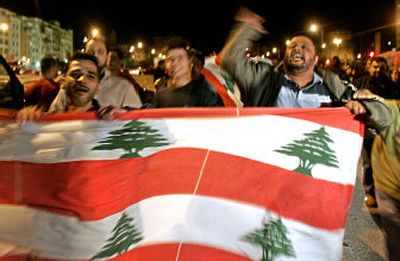U.S., Britain seek meeting on possible Syria sanctions

WASHINGTON – President Bush called on the United Nations on Friday to meet urgently to consider taking action against Syria after a U.N. investigation implicated top officials in the regime of President Bashar Assad in the assassination of Lebanon’s leading reformer.
In a sign of the sudden escalation in tension between Syria and the international community, Britain on Friday called for the world body to consider punitive sanctions on Damascus. The Security Council is expected to meet Tuesday to consider possible actions for two new resolutions, according to U.S. and U.N. officials.
Bush called the detailed U.N. investigative report into the Feb. 14 killing of former Lebanese Prime Minister Rafik Hariri “very disturbing” and asked Secretary of State Condoleezza Rice to immediately convene the foreign ministers from the 15 Security Council members to “respond accordingly” to its allegations.
“The report suggests, strongly suggests, the politically motivated assassination of Prime Minister Hariri could not have taken place without Syrian involvement,” Bush said, speaking in front of a piece of the Berlin Wall at the Reagan Presidential Library in Simi Valley, Calif.
Intense diplomatic discussions are expected to continue through the weekend among U.S., British, French and Russian officials to broker consensus behind potential punitive action, according to U.S. and U.N. officials.
Ideas under discussion range from a ban on Syrian international flights and trade limitations to an embargo on goods that can be used for military purposes, according to Western officials familiar with the diplomacy who spoke on condition of anonymity. Envoys also are considering demanding that Assad, who inherited power from his father in 2000, require those named in the report to help in the investigation – or take action himself against them.
The U.N. may lay out a series of steps Syria must take over a limited time, giving it an opportunity to more fully cooperate with investigators, Western envoys said. Secretary-General Kofi Annan has extended the investigation, conducted by German prosecutor Detlev Mehlis, through Dec. 15.
The report stirred drama Friday as it became clear that a key passage had been edited at the last minute and that names of Assad family members and Syrian officials had been deleted from the version released publicly.
The original report, which became public Friday, included allegations that two family members and three top intelligence and security officials plotted the bombing of Hariri’s entourage as it drove through Beirut, killing 22 others.
The document, compiled after a four-month probe by Mehlis, named Gen. Assef Shawkat, Assad’s brother-in-law and the head of Syrian military intelligence, and Maher Assad, the president’s younger brother. A witness told Mehlis’ commission that the two men and the three others decided to kill Hariri two weeks after the passage of U.N. Resolution 1559 in September 2004. The resolution, co-sponsored by the United States and France, called for an end to Syria’s nearly three-decade-long occupation of Lebanon.
Syria’s ambassador to Washington, Imad Moustapha, charged Friday that the probe was based on “tales, innuendos” and did not contain a single substantiated piece of evidence that could be used in a court of law. “It is based on political attitudes, not fact,” he said in an interview.